 How to Deal with the Aftermath of the Texas Winter Storm in a Way that Builds Trust
How to Deal with the Aftermath of the Texas Winter Storm in a Way that Builds Trust
LinkedIn
February 23, 2021
This "once-in-a-lifetime" Texas winter storm, for the most part, is behind us. The state governor decided to put the investigation of the causes of the power outages on the agenda for the current legislative session, and we already know what's coming next. In fact, it already begun.
See publication
Tags: Management, Culture, Entrepreneurship
 What the Texas Storms can Teach us about Trust
What the Texas Storms can Teach us about Trust
LinkedIn
February 22, 2021
Last week, my family and I spent three days with no electricity, heat, and were told to conserve water, even at the risk of our water pipes bursting, because both power and water equipment did not weather the storm (no pun intended). Trust was broken in many respects, but I thought I will share with you my own perspective of where trust failed.
See publication
Tags: Culture, Entrepreneurship
 Do you want to be around smart people who disagree with you?
Do you want to be around smart people who disagree with you?
LinkedIn
October 12, 2018
One of the TV shows I love the most is The West Wing. There is an episode where Leo McGarry, the Chief of Staff, interviews Ansley Hayes, a young lawyer, to be an associate White House counsel.
But here's the deal, Ms. Hayes is a Republican, and the White House is Democrat. I'm not going to get political with this post, but for that reason Ansley finds it very hard to believe that they want her to work there.
See publication
Tags: Innovation
 Don't ban laptops and phones from meetings!
Don't ban laptops and phones from meetings!
LinkedIn
October 08, 2018
A headline asking the same caught my eyes at CNN Business this morning. The article quoted researchers from the University of Texas at Austin who claimed that the presence of phones prevents us from learning effectively. Smart phones and laptops distract us. Using them is disrespectful towards others in the meeting.
See publication
Tags: Innovation
 DO NOT OPEN IMMEDIATELY! Click-bait and trust.
DO NOT OPEN IMMEDIATELY! Click-bait and trust.
LinkedIn
August 24, 2018
Are you receiving letters that are marked "DO NOT BEND," "CHECK INSIDE," "NON-TRANSFERABLE," "FINAL NOTICE," "OPEN IMMEDIATELY!""Pay to the order of..." or any other terminology that makes you open them, just to find an advertisement that has nothing to do with the impression you got when you looked at it? I know I am.
See publication
Tags: Innovation
 How The Government Could Easily Boost Crowdfunding, Innovation, And Jobs
How The Government Could Easily Boost Crowdfunding, Innovation, And Jobs
Inc
January 31, 2018
The Jumpstart Our Business Startups (JOBS) Act was signed into law by President Obama in May 2012. The idea was to relax regulations that prevented or slowed early stage investments by non-institutional investors. One of the main achievements of the new law was to allow crowdfunding.
See publication
Tags: Innovation, Open Innovation, GovTech
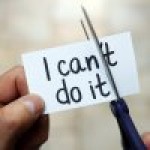 You Are Not Implementing Strategy For The Same Reason You Are Not Losing Weight
You Are Not Implementing Strategy For The Same Reason You Are Not Losing Weight
Inc
January 31, 2018
In the summer of 2012 I visited the NBC TODAY Show in New York. The topic discussed in that segment was weight loss. As the reporter turned to me, she asked me if I had any questions.
See publication
Tags: Innovation
 3 Reasons Children Lose Creativity As They Grow Up
3 Reasons Children Lose Creativity As They Grow Up
Inc
January 30, 2018
The factor that affects team productivity and creativity is the ability to conduct constructive conflict. In turn, three other factors that affect that ability, which are strong in children, and disappears when they reach adulthood and the work environment.
See publication
Tags: Innovation, Creativity
 The Best Way for Companies to Invest Their Tax Cuts
The Best Way for Companies to Invest Their Tax Cuts
Inc
January 29, 2018
Walmart, AT&T, and Starbucks, to name a few, have already passed on the tax cuts to their employees, in the form of pay increases and bonuses. Here are five alternatives that companies have, and how they affect their shareholders.
See publication
Tags: Innovation
 Why Creativity And Strategy Need Opposite Types of Motivation
Why Creativity And Strategy Need Opposite Types of Motivation
Inc
January 26, 2018
For a long time it was accepted that incentives, and specifically financial incentives, would motivate any type of desired business behavior. In other words--everyone has a price.
See publication
Tags: Innovation, Creativity
 How Science Explains Why People Exaggerate Their Contribution to the Team
How Science Explains Why People Exaggerate Their Contribution to the Team
Inc
January 23, 2018
Try this experiment: Ask each member of a team that has just achieved a milestone what their contribution was to that achievement, percentage-wise. Ask them independently. Then add those percentages up. You would expect to get 100 percent, right? In reality, you are likely to get more than 100 percent. Sometimes much more.
See publication
Tags: Innovation
 A Seemingly Innocent Email Hack That Could Destroy Creativity
A Seemingly Innocent Email Hack That Could Destroy Creativity
Inc
January 11, 2018
Innovation is a team sport. You must rely not only on your own ingenuity and creativity, but also on that of your team members. Innovation also requires a culture of innovation, of which team dynamics play a critical role.
See publication
Tags: Innovation, Creativity
 Why You Should Not Set Goals For 2018, And Do This Instead
Why You Should Not Set Goals For 2018, And Do This Instead
Inc
January 01, 2018
As 2017 ends, you start setting your goals for 2018. Your goals are typically set as outcomes, such as "lose 50 pounds," "make $100,000 in paid speeches," "save $25,000," and the like. And it makes sense because, after all, you care more about losing 50 pounds than about working out every day. You care more about making $100,000 in paid speeches than about the required marketing activities.
See publication
Tags: Innovation
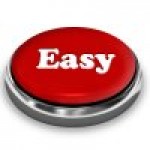 Want To Improve Company Culture? Fix it Early On
Want To Improve Company Culture? Fix it Early On
Inc
December 27, 2017
made me realize that the reason people are more creative when they work in startups than when they work in mature companies is due to the difference in culture of those two types of companies.
See publication
Tags: Innovation, Culture
 The Hiring Mistake That Would Kill Your Company's Culture
The Hiring Mistake That Would Kill Your Company's Culture
Inc
December 20, 2017
When a startup is born, its founders are the creators of everything. They are the ones responsible for product (or service) development, for initial marketing and sales, and everything else that's needed.
See publication
Tags: Innovation, Culture, HR
 2 Ways Facebook Makes You Creative Every Day
2 Ways Facebook Makes You Creative Every Day
Inc
December 19, 2017
You heard a lot about the dark side of the Force. Sorry, Facebook... A former Facebook VP said that social media is destroying society and ripping us apart, and recommended we should take a hard break from social media (maybe that's why he's "former?").
See publication
Tags: Innovation
 Why Phone Cameras Are Built Backwards
Why Phone Cameras Are Built Backwards
Inc
December 14, 2017
In a recent study, market research firm Nielsen found that 6 out of every 10 pictures taken with a camera phone were selfies, using the user-facing camera. Phone maker HTC claimed in 2014 that this number was closer to 9 out of 10
See publication
Tags: Innovation
 The One Element Missing From Your Strategy Planning
The One Element Missing From Your Strategy Planning
Inc
December 13, 2017
In a previous article, I compared the development and execution of strategy to the use of your car navigation system. The three main elements of this analogy are very clear to see:
See publication
Tags: Innovation
 Why Trust Is Important to the Team, and the Prerequisites for It
Why Trust Is Important to the Team, and the Prerequisites for It
Inc
December 12, 2017
Creative and collaborative teamwork will only take place if there is a high level of trust among team members. Trust allows members of the team to do three things that produce true collaboration.
See publication
Tags: Innovation
 How To Stop The Decline of Small Business Saturday
How To Stop The Decline of Small Business Saturday
Inc
November 29, 2017
Right there between Black Friday and Cyber Monday resides Small Business Saturday. It's a day dedicated for shopping at your local small business. According to American Express (the sponsor of Small Business Saturday), sales were down this year compared to 2016.
See publication
Tags: Innovation
 The Secret to Highly Productive Meetings? These 3 Words
The Secret to Highly Productive Meetings? These 3 Words
Inc
November 28, 2017
As I've written about before, your ability to achieve effective, productive, and creative teamwork depends on the level of trust among team members, their ability to conduct constructive conflict, their willingness to be vulnerable and ask stupid questions or propose stupid ideas, the willingness to give constructive feedback, and the confidence to accept such feedback and really listen to it.
See publication
Tags: Innovation
 The Secret to Avoiding Thanksgiving Family Feuds? These 8 Tips
The Secret to Avoiding Thanksgiving Family Feuds? These 8 Tips
Inc
November 22, 2017
The holidays bring people together. A lot of people. Tensions tend to run high, and arguments turn into fights, some of which will never be recovered from. You can already feel the tension on your way to the family gathering. You feel you are about to be undressed publicly.
See publication
Tags: Innovation
 One Brain Skill That Will Make You Creative
One Brain Skill That Will Make You Creative
Inc
November 21, 2017
The most common form of creativity is the combinational creativity. That's when old ideas in your head combine in your medial prefrontal cortex into new ideas. Although it seems accidental, this process is far from it.
See publication
Tags: Innovation, Creativity
 One Question That Will Make Every Meeting Productive
One Question That Will Make Every Meeting Productive
Inc
November 17, 2017
In our politically correct culture, fraught with polarization, constructive conflict has been all but eliminated. Your ability to conduct constructive conflict depends on three things: your willingness to be vulnerable and propose stupid ideas or ask stupid questions, your courage to give direct and constructive feedback, and your willingness to accept such feedback and criticism yourself, without taking it personally.
See publication
Tags: Innovation
 Can I TRUST You?: 55+1 Habits that will make you a trusted Consultant, Advisor, or Coach
Can I TRUST You?: 55+1 Habits that will make you a trusted Consultant, Advisor, or Coach
Innovation Culture Institute LLC
September 10, 2021
If you are a trustworthy consultant, advisor, or coach, you have a 100% probability of getting business when competing with an untrustworthy competitor. There is even a 29.6% price premium for trustworthiness. But being trusted by your client is critical even more after the deal is inked, throughout the entire engagement.
In this 5th book in the series Can I TRUST You? 15-time author, keynote speaker, workshop creator and facilitator, and top-20 global organizational culture thought leader Dr. Yoram Solomon shows you that trust is relative and dynamic, rather than absolute, universal, or static. This book is tailored for you as a consultant, advisor, or coach, and focuses on the two stages of your business: getting the business and maintaining the business.
This tip-book includes a summary of the 8 laws of trust, the 6 components of trustworthiness, and a 7-step process with 55+1 habits that will help you be a more trusted consultant, advisor, or coach.
See publication
Tags: Culture, Customer Loyalty, Sales
 Can I TRUST You?: 60+1 Habits that will help you build trust and be a trusted Project Manager
Can I TRUST You?: 60+1 Habits that will help you build trust and be a trusted Project Manager
Independently published
March 22, 2021
Research showed that having high trust within the project team increases the project performance by 45%. Do you care about improving your on-schedule, on-budget, on-specifications performance by 45%?In his research, 14-time author and top-20 global organizational culture thought leader Dr. Yoram Solomon found that a high level of trust increases the willingness to give autonomy, practice accountability, and engage in constructive disagreement. Those lead to high creativity and productivity which, in turn, deliver 45% better project performance. You, the Project Manager, are best positioned to build trust in the team, but how do you build trust? In this fourth book in the series Can I TRUST You? Solomon explains how you, the Project Manager, can assess trust in the team, build trust, and be more trusted. This tip-book includes a summary of the 8 laws of trust, the 6 components of trustworthiness, and a 7-step process with 60+1 habits that will help you build trust, be trusted, and know who to trust.
See publication
Tags: Leadership, Culture, Risk Management
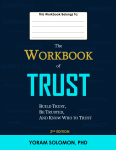 The WORKBOOK of Trust - 2nd Edition
The WORKBOOK of Trust - 2nd Edition
Amazon KDP
December 23, 2020
The WORKBOOK of Trust is a personal companion workbook to The Book of Trust. It is made to be used in workshops and online courses based on The Book of Trust. It includes 11 summary pages, 12 reference pages, 6 quizzes, and 12 assignments that will take you through the 7-step process of building you individual plan to be more trusted.About The Book of TrustIn the book, 13-times author Dr. Yoram Solomon shows you how to build the most important quality you can have: your trustworthiness. A trustworthy salesperson can sell the same product for 29.6% higher price. A trustworthy leader can increase productivity by 64%. Trustworthy CEOs generate 286% better shareholder returns. Yet, trust is deteriorating rapidly in our country. We have lost trust in the government, the media, major brands, our companies, and in each other. This book explains the eight laws of trust:Law #1: Trust is ContinuousLaw #2: Trust is ContextualLaw #3: Trust is RelativeLaw #4: Trust is AsymmetricalLaw #5: Trust is TransferableLaw #6: Trust is ReciprocalLaw #7: Trust is DynamicLaw #8: Trust is Two-sidedThe model in this book demonstrates how to build your trustworthiness through six components: competence, shared values, fairness/symmetry, positivity, time, and intimacy. This model is based on more than a decade of research done by the author, decades of experience as an executive and board member of multiple organizations, from startups to multi-billion dollar entities, as an elected official, and as a member of the Israeli Defense Forces 35th Airborne Paratroopers brigade. This book is not theoretical. While based on research, it offers an easy to follow and implement seven-step action plan that would help you identify and build the habits that will make you trustworthy with 95% success rate. It is accompanied by a series of mini-books that include specific, one-page habits that would address any trustworthiness issue you might have in any relationship, professional or personal.
See publication
Tags: Change Management, Culture, HR
 The Book of Trust: Build Trust, Be Trusted, Know who to Trust
The Book of Trust: Build Trust, Be Trusted, Know who to Trust
Amazon KDP
September 10, 2020
In The Book of Trust 13-times author Dr. Yoram Solomon shows you how to build the most important quality you can have: your trustworthiness. A trustworthy salesperson can sell the same product for 29.6% higher price. A trustworthy leader can increase productivity by 64%. Trustworthy CEOs generate 286% better shareholder returns. Yet, trust is deteriorating rapidly in our country. We have lost trust in the government, the media, major brands, our companies, and in each other. This book explains the eight laws of trust: Law #1: Trust is Continuous; Law #2: Trust is Contextual; Law #3: Trust is Relative; Law #4: Trust is Asymmetrical; Law #5: Trust is Transferable; Law #6: Trust is Reciprocal; Law #7: Trust is Dynamic; Law #8: Trust is Two-sided; The model in this book demonstrates how to build your trustworthiness through six components: competence, shared values, fairness/symmetry, positivity, time, and intimacy. This model is based on more than a decade of research done by the author, decades of experience as an executive and board member of multiple organizations, from startups to multi-billion dollar entities, as an elected official, and as a member of the Israeli Defense Forces 35th Airborne Paratroopers brigade. This book is not theoretical. While based on research, it offers an easy to follow and implement seven-step action plan that would help you identify and build the habits that will make you trustworthy with 95% success rate. It is accompanied by a series of mini-books that include specific, one-page habits that would address any trustworthiness issue you might have in any relationship, professional or personal.
See publication
Tags: Change Management, Culture, HR
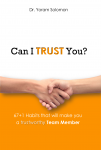 Can I TRUST You? 67+1 Habits that will make you a trustworthy TEAM MEMBER
Can I TRUST You? 67+1 Habits that will make you a trustworthy TEAM MEMBER
Trust Building Institute Press
May 26, 2019
In his research, 11-time author and top-20 global organizational culture thought leader Dr. Yoram Solomon found that the ability to hold a constructive disagreement within a team was a key component of a company’s creativity and productivity culture. That ability depends on three things: the willingness of each member of the team to be vulnerable, to provide direct feedback, and to be receptive to feedback. The existence of any of those three heavily depends on the team trust level. When trust was high, the willingness to be vulnerable was 240% higher, the willingness to provide direct feedback was 106% higher, and receptivity to feedback was 76% higher. He also found that team members valued their peers’ trustworthiness the most, as much as the next four qualities combined.
In this third book in the series Can I TRUST You? Solomon explains how trust gets built between team members and offers 67+1 habits that will make you a trustworthy member.
See publication
Tags: Culture, HR, Leadership
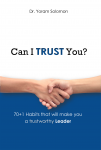 Can I Trust You?: 70+1 Habits that will make you a trustworthy LEADER
Can I Trust You?: 70+1 Habits that will make you a trustworthy LEADER
Trust Building Institute Press
April 28, 2019
When 10-time author and top-20 global organizational culture thought leader Dr. Yoram Solomon conducted a study asking, “what is the most important quality for you in other people?” Five out of six types of participants answered: Trustworthiness (66% of the time). Only one type didn’t: Leaders. Apparently, the quality most important to leaders in their employees is their willingness to work hard. This is the new leadership failure. Leaders are not willing to trust their employees. Leaders are 67% less likely to want their employees to take risks, then they employees want to see them accept risk. As a result, employees don’t trust leaders. Being a trustworthy leader makes your entire organization 64% more productive, effective, and innovative. Do you care about any of those?In this second short book in the series Can I TRUST You? Dr. Solomon explains how trust gets built between a leader and an employee and offers 70+1 habits that will make you a trustworthy leader.
See publication
Tags: Culture, HR, Leadership
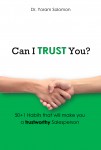 Can I Trust You?: 50+1 Habits that will make you a trustworthy salesperson
Can I Trust You?: 50+1 Habits that will make you a trustworthy salesperson
Trust Building Institute Press
March 08, 2019
Do you feel that the traditional sales “tricks” are simply not working anymore? Well, you are right to feel that. Your customers have become desensitized to those. They know all the tricks, and they don’t buy them anymore. After a decade of research, 9-time author and top 20 Global Thought Leader on Culture, Dr. Yoram Solomon, found that customers are more influenced by one thing, and it’s something you have been ignoring all those years of trying to manipulate your customer to making a purchase decision: your trustworthiness. He found that trustworthy sales people can sell the same product or service for a 29.6% higher price, and that untrustworthy salespeople must discount their offerings by 22.8% before they can be considered. In this short book, Dr. Solomon explains how trust gets built between a salesperson and a customer and suggests 50+1 habits that will make you a trustworthy salesperson.
See publication
Tags: Culture, Leadership, Sales
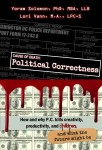 Cause of Death: Political Correctness: How and why P.C. kills creativity, productivity, and children, and what the future might be
Cause of Death: Political Correctness: How and why P.C. kills creativity, productivity, and children, and what the future might be
Trust Building Institute Press
April 27, 2018
Seven-time author Yoram Solomon, a corporate culture and creativity expert, and three-time author Lori Vann, a teen self-injury and suicide expert, team up to address one of the biggest problems of our times: Political Correctness. In the first part of the book they address the psychological effects of political correctness and the devastating consequences of it to corporate creativity, productivity, political polarization, and the increase in teen self-injury and suicide. In the second part they describe the surprising causes of political correctness, tracking it down to a life-altering event that happened almost 50 years ago, and to a new kind of investment, for the first time named in this book: litigation-based securities. Finally, in the third part, "2034," the authors offer two fictional, albeit plausible alternate futures: one that might take place if America continues on the current path of political correctness, and the other if it breaks out of this vicious cycle. This timely book is based on vast amounts of data collected and research conducted over several decades, and includes many stories ripped from the headlines, and had already led to a TED talk. The book is non-political, and anything but politically correct.
See publication
Tags: Culture, Innovation, Social
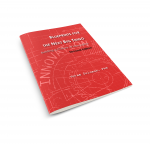 Blueprints for the Next Big Thing: Building a Culture of Innovation 2nd Edition
Blueprints for the Next Big Thing: Building a Culture of Innovation 2nd Edition
Trust Building Institute Press
September 09, 2017
Consistently innovative companies hold 6 times the market share, make 6 times the revenue, 3 times the profit, and do 50% better during economic downturns than the average company. The purpose of this book is to answer the question you are likely to ask when considering me (or anyone else) for a position of a Vice President of Strategy and Innovation, or as a consultant in those areas: “what will you be doing for me?” This book outlines the entire process of building a culture of innovation, developing clear and executable strategies, and finding the next big thing for your company, in a repeatable, consistent manner. This book references previous books I wrote, specifically three: UN-KILL CREATIVITY—How Corporate America can Out-Innovate Startups (2016), BOWLING WITH A CRYSTAL BALL—How to predict technology trends, create disruptive implementations and navigate them through industry (2nd Ed., 2015), and my Doctoral Dissertation: FROM STARTUP TO MATURITY—A case study of employee creativity antecedents in high tech companies (2010). I am not worried that you might take these blueprints and decide to implement them yourself, without me. The equivalent would be to read the manual for the F/A-18 Hornet fighter jet, and then taking one for a joyride. This book covers the what, but the how comes from my decades of experience, knowledge, research, and more than all—lessons learned from implementing every element of this book in multiple companies. The second edition adds a list of Intellectual Property assets, including models, tools, and assessments.
See publication
Tags: Innovation, Culture, Legal and IP
 Culture starts with YOU, not your boss! The 5 Pieces of the Innovation Culture Puzzle
Culture starts with YOU, not your boss! The 5 Pieces of the Innovation Culture Puzzle
CreateSpace
August 16, 2017
In his doctoral research, author Yoram Solomon showed that the factors affecting creativity and productivity the most could be summed up with one word—culture. He published his findings in his book Un-Kill Creativity: How Corporate America can out-innovate startups. However, he also found that employees play a major role in creating the right culture, and should not put the burden solely on management. Through 9 fictional stories, inspired by true events, he explains the model for building a culture of innovation.
Finally, he explains how to build trust in a team, and why we tend to skip between politically-correct arguments directly to destructive, personal and emotional conflicts, avoiding the constructive conflict in the middle.
See publication
Tags: Culture, Innovation, Leadership
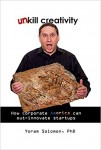 Un-Kill Creativity: How Corporate America can out-innovate startups
Un-Kill Creativity: How Corporate America can out-innovate startups
CreateSpace Independent Publishing Platform
October 07, 2016
Is innovation accidental? Why do we get the best ideas in the shower? Why are people creative in startup companies more than in Fortune 500 companies? In his fifth book, un kill creativity, researcher, author, and keynote speaker Dr. Yoram Solomon answers these and other questions, based on his doctoral research (From Startup to Maturity), his firsthand innovation experience, and the stories of some of the world’s most innovative companies, such as Apple and Lockheed’s Skunk Works.
See publication
Tags: Innovation, Startups, Management
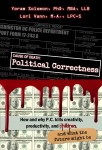 Bowling with a Crystal Ball: How to predict technology trends, create disruptive implementations and navigate them through industry 2nd Edition
Bowling with a Crystal Ball: How to predict technology trends, create disruptive implementations and navigate them through industry 2nd Edition
Trust Building Institute Press
November 02, 2015
When asked;“Where do great ideas come from?” the author replied: “from the future!” A significant, timely, and ambitious endeavor, Bowling with a Crystal Ball by Dr. Yoram Solomon, is relevant to developers, strategists, marketers, venture capitalists and academia alike. The book examines the impact of state-of-the-art technologies on consumer-driven markets. A follower of disruptive technologies with an insider's track, the author shares tools and techniques to teach readers how to tap into future trends. In three parts, delivered in a very personal manner, the author teaches the art of accurately forecasting fast-moving technology trends, creating value-add market disruptions, and navigating them through the industry maze to success. Originally published in 2007, it served as a textbook for a technology and industry forecasting class at the Institute for Innovation and Entrepreneurship at the University of Texas at Dallas. This 2015 edition adds the story behind the creation of USB 3, as well as an introduction to the author’s third book, un-kill creativity, demonstrating how established companies can out-innovate startups without having to acquire them.
See publication
Tags: Emerging Technology, Innovation, Predictive Analytics
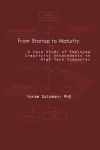 From Startup to Maturity: A case study of employee creativity antecedents in high tech companies
From Startup to Maturity: A case study of employee creativity antecedents in high tech companies
Trust Building Institute Press
November 02, 2015
Companies start their lives as startups, privately funded, small, focused, and not profitable. As they mature, they often become publicly traded, profitable, much bigger, and involved in multiple projects. Christensen (1997) found that startup companies are more innovative than mature companies. Amabile (1988), Ekvall (1996), and others developed a list of organizational factors affecting the creativity of individuals in organizations. The purpose of this study is to explore the differences in the organizational climate and personal context for creativity between mature companies and startup companies, and the resulting differences in the level of experienced individual creativity between those companies. This exploratory, interview based case study used a sample of 20 participants who worked for both startup and mature companies, and explored the differences in the participants’ experiences of creativity and the factors contributing to, or inhibiting creativity. This study found that individuals experienced higher degree of creativity in startup companies than in mature ones, that the organizational factors conducive to creativity were perceived as higher in the startup companies, while the organizational factors inhibiting creativity were perceived as higher in the mature companies, explaining the experienced higher degree of individual creativity in startup companies, and potentially explaining why startup companies are more innovative than mature ones. The study did not find significant differences in personal context factors between the two types of companies.
See publication
Tags: Culture, Entrepreneurship, Innovation
 Geeks, Geezers & Googlization Show - Where Has All Our Trust Gone (and How to Regain It), with Ira Wolfe.
Geeks, Geezers & Googlization Show - Where Has All Our Trust Gone (and How to Regain It), with Ira Wolfe.
Googlization Nation
September 22, 2021
Trust is deteriorating all around us. We have lost trust in our government, military, police, public health officials, business leaders and even neighbors and family members. And who hasn’t done something to break a trust. To make sense about what’s happened to trust, we’re excited to welcome Dr. Yoram Solomon to this episode of Geeks Geezers Googlization. Yoram will explain why trust is not what most of us think it is and share his 8 laws of trust. You don’t want to miss his tips on how to build trust in a team, what you can do to be more trusted, and even regain the trust we lost.
See publication
Tags: Change Management, Culture, Customer Loyalty
 The Mindset Game with Vered Kogan. Episode 53: How to Build and Earn Trust: Interview with Yoram Solomon.
The Mindset Game with Vered Kogan. Episode 53: How to Build and Earn Trust: Interview with Yoram Solomon.
The MINDset Game Podcast
July 20, 2021
In Episode 53 of The MINDset Game Podcast, Vered Kogan speaks with Yoram Solomon, author, TEDx speaker, and Host of The Trust Show podcast.
You will learn invaluable tips and strategies on the topic of trust, including how to build trust, how to be more trusting and trustworthy, how to know who to trust, and what to do when someone breaks your trust.
See publication
Tags: Change Management, Culture, Customer Loyalty
 A Sales Culture Toddcast! "Do You Know What Trust Is?"
A Sales Culture Toddcast! "Do You Know What Trust Is?"
Apple Podcast
March 23, 2021
This Toddcast is a MUST hear! Join me and my guest Dr. Yoram Solomon, Ph.D. Yoram is one of the world's leading authorities on the topic of trust and what it means to sales and our ability to maintain long-term relationships.
See publication
Tags: Culture, Customer Experience, Sales
 How Do We regain Trust? (Episode 2704)
How Do We regain Trust? (Episode 2704)
McCuistion TV / KERA / NPR
January 24, 2021
Our trust in institutions, politicians and government, scientists, medicine, and the media has been steadily declining in the last decade. The cause of this paradox can be found in people’s fears about the future and their role in it, which are a wake-up call for our institutions to embrace a new way of effectively building trust: balancing competence with ethical behavior.
See publication
Tags: Culture, GovTech, Leadership
 Earning Trust In Business, Sales And Relationships.
Earning Trust In Business, Sales And Relationships.
Ron Ruth
October 26, 2020
Businesses and organizations call on Yoram’s expertise to not only teach their sales reps and executives how to be more trusted, but how to know who to trust. His lessons are based on years of original research, years of service as an elected official and as an executive, and service at the IDF 35th Airborne Brigade.
Trust Me!
See publication
Tags: Culture, Leadership, Risk Management
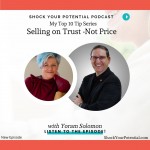 Shock your Potential Podcast | My Top 10 Tip Series | Selling on Trust-Not Price
Shock your Potential Podcast | My Top 10 Tip Series | Selling on Trust-Not Price
Shock Your Potential Podcast
September 02, 2020
What is the value of trust? People will not buy something from someone they don’t trust. As a salesperson, building trust with your customers is critical, and it may even allow you to sell at a higher price when trust is established.
Listen in while Yoram shares his top 10 (+ 1) tips for selling on trust, not price.
See publication
Tags: Culture, Leadership, Sales
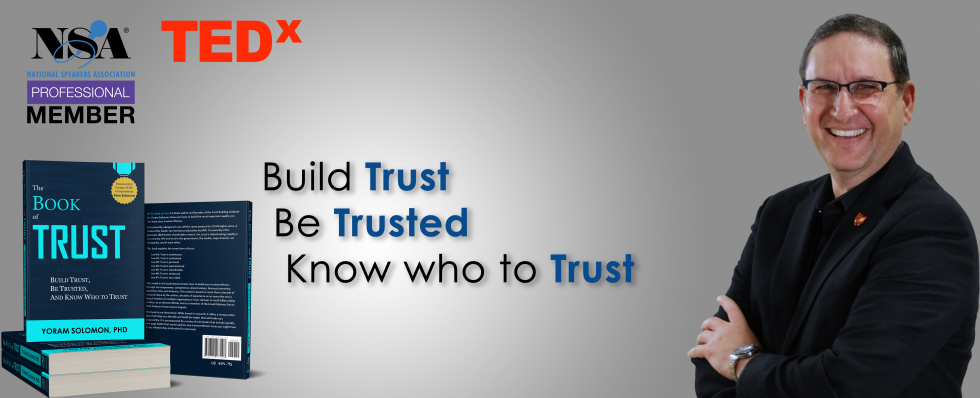

 Adjunct Professor of Entrepreneurship
Adjunct Professor of Entrepreneurship
 How to Deal with the Aftermath of the Texas Winter Storm in a Way that Builds Trust
How to Deal with the Aftermath of the Texas Winter Storm in a Way that Builds Trust
 What the Texas Storms can Teach us about Trust
What the Texas Storms can Teach us about Trust
 Do you want to be around smart people who disagree with you?
Do you want to be around smart people who disagree with you?
 Don't ban laptops and phones from meetings!
Don't ban laptops and phones from meetings!
 DO NOT OPEN IMMEDIATELY! Click-bait and trust.
DO NOT OPEN IMMEDIATELY! Click-bait and trust.
 How The Government Could Easily Boost Crowdfunding, Innovation, And Jobs
How The Government Could Easily Boost Crowdfunding, Innovation, And Jobs
 You Are Not Implementing Strategy For The Same Reason You Are Not Losing Weight
You Are Not Implementing Strategy For The Same Reason You Are Not Losing Weight
 3 Reasons Children Lose Creativity As They Grow Up
3 Reasons Children Lose Creativity As They Grow Up
 The Best Way for Companies to Invest Their Tax Cuts
The Best Way for Companies to Invest Their Tax Cuts
 Why Creativity And Strategy Need Opposite Types of Motivation
Why Creativity And Strategy Need Opposite Types of Motivation
 How Science Explains Why People Exaggerate Their Contribution to the Team
How Science Explains Why People Exaggerate Their Contribution to the Team
 A Seemingly Innocent Email Hack That Could Destroy Creativity
A Seemingly Innocent Email Hack That Could Destroy Creativity
 Why You Should Not Set Goals For 2018, And Do This Instead
Why You Should Not Set Goals For 2018, And Do This Instead
 Want To Improve Company Culture? Fix it Early On
Want To Improve Company Culture? Fix it Early On
 The Hiring Mistake That Would Kill Your Company's Culture
The Hiring Mistake That Would Kill Your Company's Culture
 2 Ways Facebook Makes You Creative Every Day
2 Ways Facebook Makes You Creative Every Day
 Why Phone Cameras Are Built Backwards
Why Phone Cameras Are Built Backwards
 The One Element Missing From Your Strategy Planning
The One Element Missing From Your Strategy Planning
 Why Trust Is Important to the Team, and the Prerequisites for It
Why Trust Is Important to the Team, and the Prerequisites for It
 How To Stop The Decline of Small Business Saturday
How To Stop The Decline of Small Business Saturday
 The Secret to Highly Productive Meetings? These 3 Words
The Secret to Highly Productive Meetings? These 3 Words
 The Secret to Avoiding Thanksgiving Family Feuds? These 8 Tips
The Secret to Avoiding Thanksgiving Family Feuds? These 8 Tips
 One Brain Skill That Will Make You Creative
One Brain Skill That Will Make You Creative
 One Question That Will Make Every Meeting Productive
One Question That Will Make Every Meeting Productive
 Should ChatGPT be Banned from the Classroom?
Should ChatGPT be Banned from the Classroom?
 Can I TRUST You?: 55+1 Habits that will make you a trusted Consultant, Advisor, or Coach
Can I TRUST You?: 55+1 Habits that will make you a trusted Consultant, Advisor, or Coach
 Can I TRUST You?: 60+1 Habits that will help you build trust and be a trusted Project Manager
Can I TRUST You?: 60+1 Habits that will help you build trust and be a trusted Project Manager
 The WORKBOOK of Trust - 2nd Edition
The WORKBOOK of Trust - 2nd Edition
 The Book of Trust: Build Trust, Be Trusted, Know who to Trust
The Book of Trust: Build Trust, Be Trusted, Know who to Trust
 Can I TRUST You? 67+1 Habits that will make you a trustworthy TEAM MEMBER
Can I TRUST You? 67+1 Habits that will make you a trustworthy TEAM MEMBER
 Can I Trust You?: 70+1 Habits that will make you a trustworthy LEADER
Can I Trust You?: 70+1 Habits that will make you a trustworthy LEADER
 Can I Trust You?: 50+1 Habits that will make you a trustworthy salesperson
Can I Trust You?: 50+1 Habits that will make you a trustworthy salesperson
 Cause of Death: Political Correctness: How and why P.C. kills creativity, productivity, and children, and what the future might be
Cause of Death: Political Correctness: How and why P.C. kills creativity, productivity, and children, and what the future might be
 Blueprints for the Next Big Thing: Building a Culture of Innovation 2nd Edition
Blueprints for the Next Big Thing: Building a Culture of Innovation 2nd Edition
 Culture starts with YOU, not your boss! The 5 Pieces of the Innovation Culture Puzzle
Culture starts with YOU, not your boss! The 5 Pieces of the Innovation Culture Puzzle
 Un-Kill Creativity: How Corporate America can out-innovate startups
Un-Kill Creativity: How Corporate America can out-innovate startups
 Bowling with a Crystal Ball: How to predict technology trends, create disruptive implementations and navigate them through industry 2nd Edition
Bowling with a Crystal Ball: How to predict technology trends, create disruptive implementations and navigate them through industry 2nd Edition
 From Startup to Maturity: A case study of employee creativity antecedents in high tech companies
From Startup to Maturity: A case study of employee creativity antecedents in high tech companies
 Innovation Culture Institute, LLC
Innovation Culture Institute, LLC
 Geeks, Geezers & Googlization Show - Where Has All Our Trust Gone (and How to Regain It), with Ira Wolfe.
Geeks, Geezers & Googlization Show - Where Has All Our Trust Gone (and How to Regain It), with Ira Wolfe.
 The Mindset Game with Vered Kogan. Episode 53: How to Build and Earn Trust: Interview with Yoram Solomon.
The Mindset Game with Vered Kogan. Episode 53: How to Build and Earn Trust: Interview with Yoram Solomon.
 A Sales Culture Toddcast! "Do You Know What Trust Is?"
A Sales Culture Toddcast! "Do You Know What Trust Is?"
 How Do We regain Trust? (Episode 2704)
How Do We regain Trust? (Episode 2704)
 Earning Trust In Business, Sales And Relationships.
Earning Trust In Business, Sales And Relationships.
 Shock your Potential Podcast | My Top 10 Tip Series | Selling on Trust-Not Price
Shock your Potential Podcast | My Top 10 Tip Series | Selling on Trust-Not Price
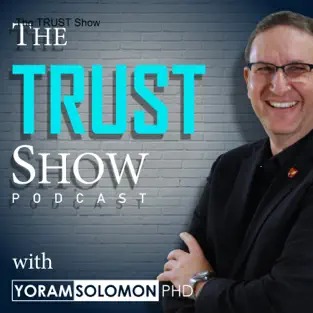 S8E7: The Formula that Makes Companies Trusted and Profitable—Revisited
S8E7: The Formula that Makes Companies Trusted and Profitable—Revisited
 The TRUST Show
The TRUST Show
